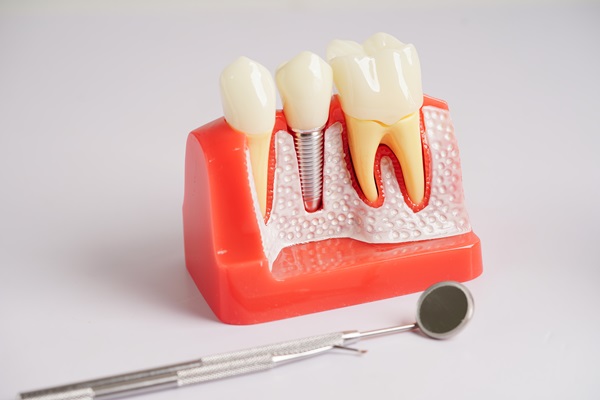The Role of the Jawbone in Dental Implant Placement

If a lost tooth is not replaced by replacement options like dental implants, you may find normal oral functions like eating and speaking somewhat challenging. The smile’s alignment and appearance will also be affected, but that is not all. Tooth loss causes bone deterioration. Dental implants can halt the progression of bone loss, but the success of the procedure requires adequate bone mass. Continue reading to find out the correlation.
Tooth replacement with dental implants
Dental implant restoration involves the surgical placement of titanium posts into the jawbone. The post integrates with the bone as patients recover from the procedure. This natural process is known as osseointegration, and if successful, ensures that the implants are sturdy enough to support the dental restoration that will be attached to them.
Bone mass and tooth loss
The teeth have an important role in jawbone health. When chewing, the teeth stimulate the bone, prompting the bone to continue nutrient supply to the jawbone and other supporting structures. After tooth loss, the jawbone loses the stimulation provided by that tooth. The body will send fewer nutrients since no stimulation is provided. Therefore, the bone’s shape starts to change.
The healthy teeth close to the gap start to shift from their positions, altering the bite. This can increase the risk of oral issues like gum disease, tooth damage, or cavities. Bruxism or TMJ disorder is another issue. Changes to the jawbone’s shape can affect facial structure, causing sagging skin and wrinkles.
Jawbone and dental implants
Implants replace the lost tooth root, restoring the lost stimulation. The procedure is innovative and helps stop further jawbone deterioration. However, the success of the treatment depends on having enough bone mass. After placing the implant post, osseointegration starts, which is essentially the bone integrating with the implants for stability and successful restoration.
Without adequate bone mass, the implant will not have the stability it needs to function. This will lead to loose, shaky implants, and ultimately, implant failure. Having a weak jawbone does not necessarily mean patients will be ineligible to get implants. The dentist might suggest getting a bone graft, which is a procedure to transfer bone mass from another part of the body or external sources to the affected portion of the jaw. The existing bone will integrate with the bone material to provide the strength required to support the dental implants.
If all of the teeth on the jaw are missing, and there has been a significant loss of bone mass, patients may still be able to get implants without undergoing a bone graft. An option is the All-on-4 procedure, which uses four implants, placed strategically along the jaw to optimize the existing jawbone and ensure proper integration.
In conclusion
Dental implants are popular among those seeking tooth replacement options that are reliable and long-lasting. The process stops bone loss in the jaw. If you do not have enough bone mass to get implants, you can undergo a bone graft procedure. To get more information or get started with the tooth restoration process, contact the dental office for an appointment.
Request an appointment here: https://smilesonbalboa.com or call Smiles On Balboa General, Esthetic, and Implant Dentistry at (415) 413-2237 for an appointment in our San Francisco office.
Check out what others are saying about our dental services on Yelp: Dental Implants in San Francisco, CA.
Recent Posts
Getting tooth implants is not the final phase of an implant restoration procedure. The stage is simple, but the recovery period can be uncomfortable. This part of the implant process is the time for the mouth heals and fuses to the implant post. The following guide covers what to expect during recovery and the steps…
Dental implants restore functionality to the smile, all while looking and feeling like natural teeth. They achieve this by fusing with the jawbone, creating a permanent, irremovable tooth replacement solution that does not slip or slide. This benefit makes them a great option for patients seeking an alternative to traditional dentures.Dental implants are metal screw-like…
Wondering about dental implants? Read on to learn more. If you have experienced tooth loss and are exploring potential replacement options, then you have probably heard about dental implants. Dentists and patients are turning to tooth implants because it is provenly effective for replacing missing teeth. However, there are different implants, each of which is…
Missing one tooth or multiple teeth can make it harder to perform everyday functions. It can also make you feel self-conscious about smiling. Dental implants not only restore the function and appearance of your smile, but they also help restore your everyday oral health.Dental implants are artificial tooth roots surgically placed in a person's jawbone.…


